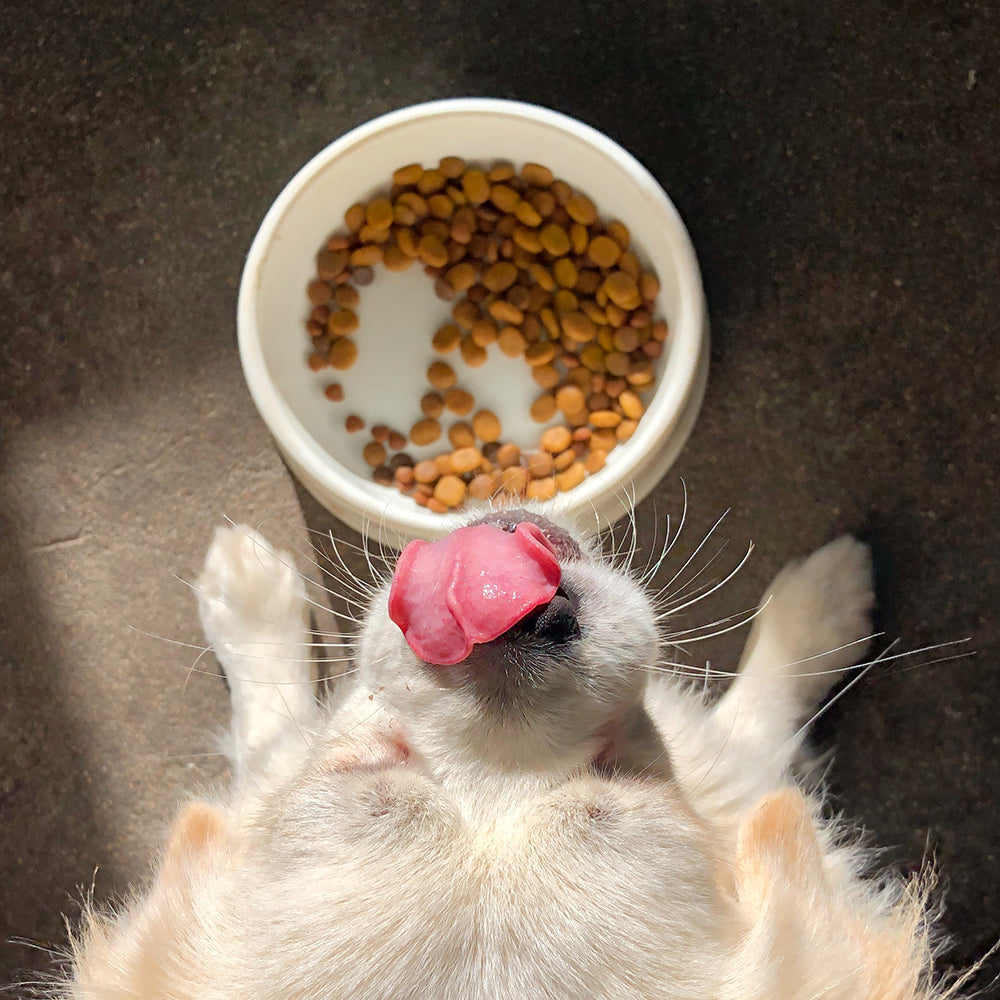
Just as humans can sometimes experience digestive issues, dogs can also encounter them. A sensitive stomach in dogs can lead to discomfort, changes in appetite and worrying symptoms for their owners. The good news? With the right knowledge and a mindful approach to their diet, most digestive problems for dogs are entirely manageable.
At Clinivet, we’re committed to helping you understand and manage sensitive stomachs in dogs, how to spot the signs, and most importantly, how to support your dog through it. Our vet-formulated dog food is designed with gentle, high-quality ingredients that promote a healthy gut and in turn, improve your dog’s happiness. In this article, we’ll explain more about the causes and symptoms of sensitive stomachs in dogs, and how to manage it as an owner successfully.
What Causes a Sensitive Stomach in Dogs?
A sensitive stomach is never a condition on its own. It’s usually a symptom of something else going on in your dog’s digestive system, which means you’ll need to get to the root cause. Common causes include:
1. Food Intolerance or Allergies
Some dogs are naturally intolerant to certain ingredients such as beef, dairy, wheat, or artificial additives. Even premium proteins can cause trouble if your dog has a specific sensitivity.
2. Sudden Changes in Diet
Dogs thrive on routine, and their digestive systems do too. Abruptly switching their food, especially to one with different protein or fibre levels, can disrupt and cause havoc to their gut microbiome, causing symptoms such as diarrhoea or vomiting.
3. Low-Quality Ingredients
Cheap fillers, artificial colours, preservatives, and by-products found in lower-grade pet foods can irritate the digestive tract. These ingredients are harder to digest and may trigger inflammatory responses.
4. Underlying Health Issues
In some cases, a sensitive stomach could be linked to conditions like inflammatory bowel disease (IBD), pancreatitis, or parasites. That’s why persistent symptoms always warrant professional advice from your vet.
Common Signs of a Sensitive Stomach
Every dog is different, but there are key symptoms that may suggest your dog is struggling with digestive discomfort:
- Frequent vomiting (not related to motion or excitement)
- Loose stools or diarrhoea
- Excessive gas or flatulence
- Gurgling stomach sounds
- Poor appetite or reluctance to eat
- Weight loss or poor body condition
- Excessive grass eating or licking lips/nose
Occasional tummy upsets can be normal, but if these symptoms occur frequently, it's time to investigate further.
How Diet Can Make a Difference
The easiest way to support a dog with a sensitive stomach is through diet, as the right food will work incredibly well in both reducing symptoms and contributing toward healthy digestion. Opt for gentle, digestible ingredients, choosing hypoallergenic protein sources like salmon or lamb and easily tolerated carbohydrates such as rice and oats to help maintain firm stools. Equally important is to always avoid artificial colours, preservatives and unnecessary fillers, which can trigger digestive upset and make symptoms worse.
Why Clinivet’s Dog Food is a Smart Choice
Clinivet’s premium dry dog food is vet-formulated with digestive health at its core, combining high-quality protein sources to minimise the risk of intolerance with a recipe free from artificial colours or preservatives that can upset sensitive systems. It’s enriched with prebiotics and probiotics to support gut health and balanced digestion, as well as carefully balanced fibre to regulate stools and prevent constipation or diarrhoea. Added omega fatty acids help reduce gut inflammation while also promoting a healthy, shiny coat. By feeding a consistent, high-quality diet, you can help keep your dog’s digestive system stable and reduce the likelihood of flare-ups.
When to See a Vet
While many digestive issues are minor and linked to diet, some symptoms warrant prompt veterinary attention. You should always contact your vet if your dog experiences vomiting or diarrhoea lasting more than 24 - 48 hours, blood in their vomit or stool, signs of dehydration such as dry gums, lethargy, or sunken eyes, a loss of appetite for more than a day, unexplained weight loss, or signs of abdominal pain like whining, restlessness, or guarding. In these cases, your vet may carry out diagnostic tests to rule out more serious conditions, including infections, organ problems, or chronic diseases.
Tips for Feeding Dogs with Sensitive Stomachs
Managing a sensitive tummy isn’t just about what you feed, it can also be about how and when. Here are a few best practices:
1. Transition Slowly
When introducing new food, even a gentler one like Clinivet’s, make the switch over 7- 10 days. Start with 75% old food and 25% new, gradually increasing the new food each day.
2. Stick to a Schedule
Dogs do best on regular feeding routines. Try to stick to the same times each day to help regulate digestion and reduce the risk of stomach upset.
3. Provide Plenty of Fresh Water
Hydration is important, especially if your dog has experienced vomiting or diarrhoea. Make sure clean water is always available.
4. Avoid Table Scraps and Treat Overload
Human food and rich dog treats can irritate a sensitive gut. Keep treats healthy, natural and limited in quantity.
5. Monitor and Adjust
Monitor your dog’s symptoms, stool consistency and appetite. If you see improvements in a new food, such as Clinivet’s sensitive dog food, stay consistent and avoid unnecessary changes that could undo your progress.
Supporting Your Dog’s Sensitive Stomach for The Long-term
Digestive problems in dogs can be distressing, but with an informed approach, they’re often easy to manage. Understanding the root cause, symptom spotting and relying on a nutritious, high-quality diet such as Clinivet’s premium dog food, you can successfully support your dog’s health from every aspect.
Every bowl of Clinivet dry dog food is a step towards better digestion, a stronger immune system and a happier, more comfortable dog. Whether you’re feeding a puppy, adult, or senior with sensitivities, we have a range of bespoke solutions that are widely recognised for delivering consistent results.
If your dog has a sensitive stomach, don’t panic - you're not alone, and there will always be a solution. With the right care, even the most sensitive dogs can live healthy, active lives. Explore our sensitive dog food range today.
